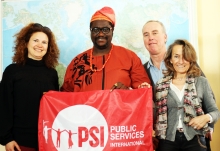WFPHA Visits the PSI Head Office

WFPHA was formed by 32 national public health associations during the 1967 World Health Assembly. It currently has 108 member associations/organisations across the world. These include national and regional public health associations as well as faculties and colleges of public health sciences.
The federation shares a number of values with the PSI. It has consistently stood up for health as a fundamental human right and a public good. Its global public health perspective is one that includes diverse social and cultural backgrounds, ethnicity, race, gender, sexual orientation and disability.
During the visit, Professor Borisch pointed out that WFPHA is committed to collaboration at all levels, from community to global as a basis for mutual learning and capacity building. Considering the pivotal relevance of PSI as the representative global trade union federation of over 7 million health workers, WFPHA she said, is quite convinced of the need for close working relations between the two bodies.
This view was reinforced, according to Dr Lomazzi, by the commendable defence of health as a human right by the PSI General Secretary, Rosa Pavanelli, during the formulation of the Five-year Implementation Plan for Health Employment and Economic Growth which WFPHA was also involved in, last December.
The PSI Deputy Secretary General, David Boys expressed the heartfelt regards of the PSI General Secretary, Rosa Pavanelli who was unavoidably absent, in welcoming Professor Borisch and Dr Lomazzi. He elaborated on the peculiar position of PSI as the Global Union Federation of workers who are employed by governments. This, he said, makes trade unionism decidedly political for PSI, as our members face governments as being both employer and the state.
Professor Borisch appreciated this. For the WFPHA, health is a political issue as much as it is one of policy. Austerity measures, she said, are based on political decisions by states. And these have adverse impact on health care delivery and health outcomes for the poor and vulnerable members of society, in particular. She further informed that practical and discursive attacks on the relevance of public health had led WFPHA to formulating A Global Charter for the Public’s Health in collaboration with the WHO, in 2015-2016.
The PSI Health and Social Services Officer, Baba Aye noted the similarities between the WFPHA’s Charter and A Better Future with Public Health Care for All manifesto, which is the platform for the PSI’s Human Right to Health Global Campaign. In the light of this, PSI and WFPHA agreed to look further into practical steps to take in working together to advocate for universal public health care and health equity within and across countries.

